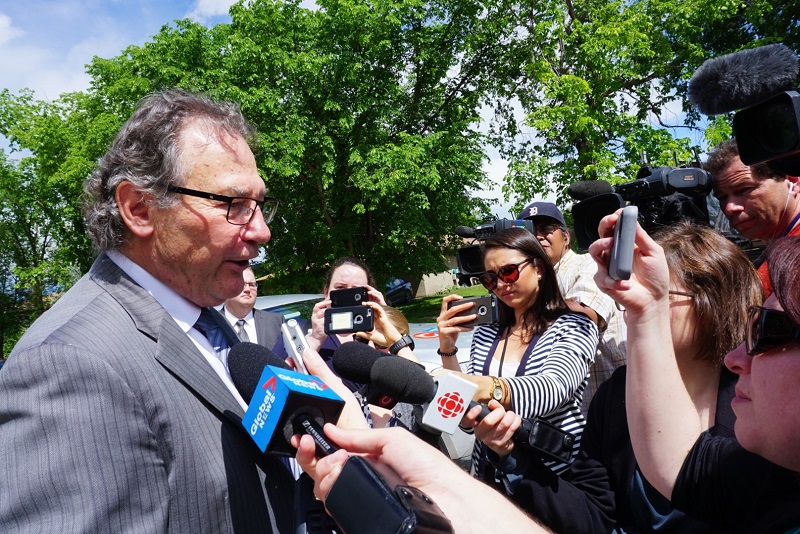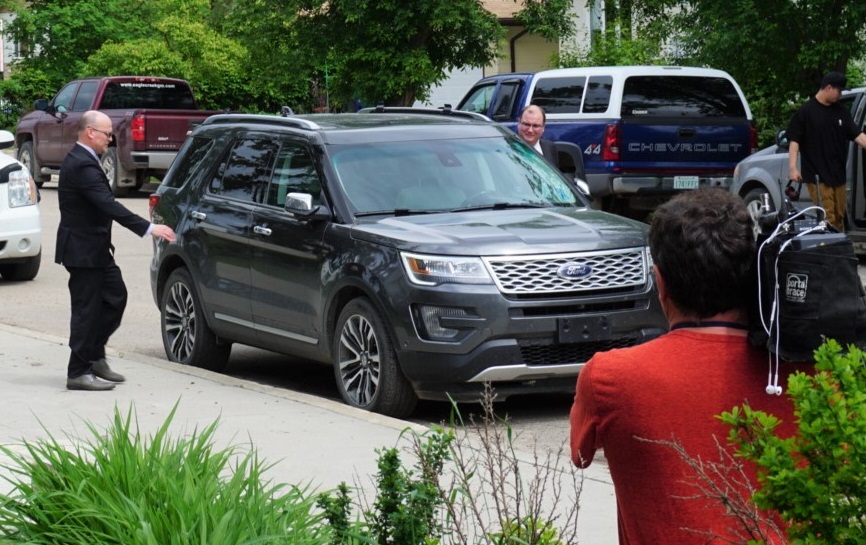Defence lawyer Aaron Fox outside court on Friday. Photo by Chelsea Laskowski.
For the first time, an expert witness at the La Loche shooter’s sentencing hearing described the teen as “remorseful” about all the murders and attempted murders he committed on January 22, 2016.
The 19-year-old, whose identity is protected by the Criminal Youth Justice Act, was 17 when he opened fire in the high school he’d been attending, killing teacher Adam Wood and educational assistant Marie Janvier, and injuring seven. Currently, the Crown prosecutor is seeking an adult sentence for the offender, who entered guilty pleas in the fall.
At the hearing, Crown witnesses described the teen as – at most – remorseful for the murders of teen brothers Dayne and Drayden Fontaine, but not remorseful about the events that took place at the school.
On Friday, expert neuropsychologist Monty Nelson took the stand as the last defence witness to testify before the case takes a two-month adjournment. He told Meadow Lake court the offender spoke with him on Thursday between 45 minutes and an hour, saying he was remorseful and showed him a letter he’d written (which he later read aloud in court) that “did go through thoughts on each particular victim.” When prosecutor Lloyd Stang expressed skepticism that this is a true sign of remorse and rather an attempt to counteract the negative response the offender’s perceived lack of remorse has gotten in court, Nelson said “certainly he is aware of what people have been saying about him, and I guess anything is possible” but that in his view, the sympathetic comments “seem quite genuine to me.”
Nelson says the offender seems more engaged, animated, and better able to describe his thoughts than when he evaluated him in July of 2016. Nelson said last summer, the offender was unsure of who he could trust and was very quiet.
Expert neuropsychologist Monty Nelson leaves court for a break during the Friday hearing. Photo by Chelsea Laskowski.
The bulk of Nelson’s testimony revolved around an IQ test Nelson performed, which found the offender to have an IQ of 68. Only two per cent of people in the offender’s age category score lower than that, with a defence psychiatrist finding that score key to his diagnosis of an intellectual development disorder in the offender.
Nelson said the offender was a very strong visual learner, adding that “he’s built for watching and doing. He’s built in some ways like an apprentice.” Earlier in the hearing, court heard he had become obsessed with watching American school shooting videos prior to January 22nd, 2016 and enjoyed hunting.
Nelson said the offender’s biggest weakness was problem solving, where he scored worse than 99 per cent of people his age. This is further exacerbated when the offender is stressed or under a time crunch.
Overall, defence witnesses painted the picture of a socially isolated teen deeply impaired by numerous disorders, such as severe depression and the intellectual development disorder.
Nelson is the final witness, aside from the possibility that a person ordered to prepare a Gladue report will be called in to answer questions.
Defence has requested an MRI to be ordered to possibly diagnose the cause of a brain injury the offender incurred in younger years, but Judge McIvor says she does not have that authority.
Instead, she says a physician referral needs to be prepared by an expert who has previously testified, and she can treat the MRI like any other court-ordered assessment. That MRI may or may not make up part of final arguments.
Final sentencing arguments will take place on Aug. 25 in Meadow Lake to allow time for the Gladue report to be prepared.

